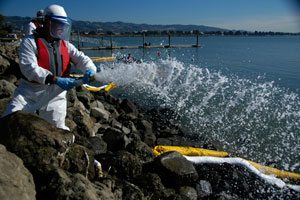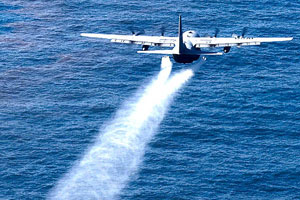A new bill is in the works that would regulate the use of dispersants on oil spills. But is it too little too late?
Sen. Frank Lautenberg (D-NJ) said Thursday that he plans to introduce the Safe Dispersants Act next week, which would require companies to disclose the chemicals in their products and compel the Environmental Protection Agency (EPA) to test the safety of the chemicals before authorizing their use. The bill would reform the current rules on dispersants, which require no safety testing and allow companies to keep the ingredients of the compounds secret.
Lautenberg announced the new measure at a hearing on dispersants Thursday morning, where EPA Administrator Lisa Jackson was put on the hot seat about their use. Sen. Barbara Mikulski (D-Md.) pressed Jackson on whether the EPA even had the authority to force BP to stop using Corexit, its dispersant of choice.
Jackson responded that it was “a matter of untested law” and a matter she was unable to weigh in on: “I would not know, I’m not an attorney.” Jackson assured Mikulski that the EPA’s lawyers would get back to her office with the specifics on their authority.
“You needed to know on day one,” Mikulski shot back.
How much power EPA has over the situation has been an outstanding question. EPA told BP to find an alternative dispersant almost two months ago, but the company chose to ignore that directive. So EPA pledged to do its own tests. (The first round of results was released several weeks ago, but testing continues.) Meanwhile, BP is still using a large volume of dispersants, with the consent of the Coast Guard.
Jackson says that while her agency is still concerned about their use, it’s still letting BP use the dispersants because they’re considered safer than the oil itself. Yet she acknowledged repeatedly that the EPA did not have enough research on the long-term impacts of the chemicals. “With the use of dispersants, we are faced with environmental trade-offs,” Jackson told the panel. “The long term effects on aquatic life are largely unknown.” But, she said, “We have not seen significant environmental impacts from the use of dispersants so far.”
Critics of the dispersants say there should have been a better understanding of the potential health impacts of disperaants, and regulations government their use, long before the Gulf disaster. “We basically entered into this with a complete lack of preparedness,” Ken Cook president of the Environmental Working Group, told the panel. “The government and oil industry long ago should have made sure we had those answers.”
A representative of Nalco, the chemical company that manufactures the dispersants BP is using in the Gulf, declined to testify at the hearing, Mikulski said.
UPDATE: A Nalco spokesman emails to say that Mikulski misspoke; “One of the trade associations that Nalco is a member of was asked to testify, Nalco was not asked to testify,” he says.













